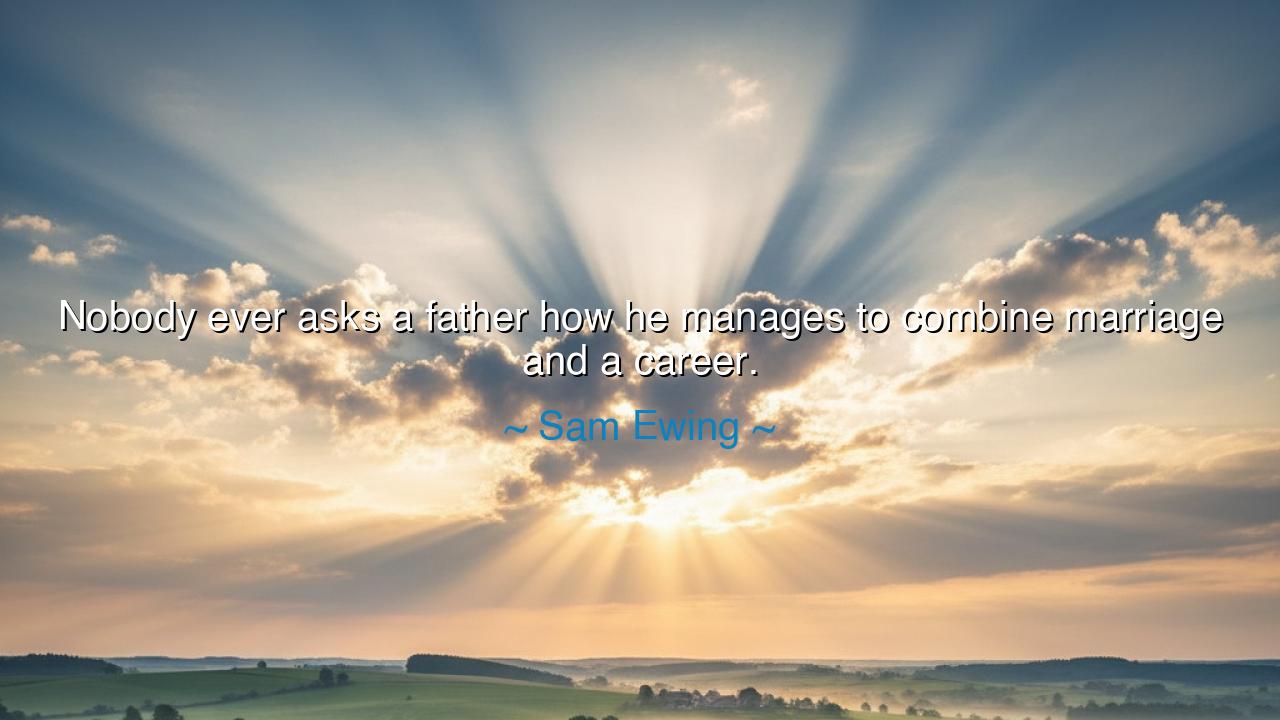
Nobody ever asks a father how he manages to combine marriage and






In the halls of time, where wisdom is carved upon the stones of memory, there comes a saying both subtle and powerful: “Nobody ever asks a father how he manages to combine marriage and a career.” These words, spoken by Sam Ewing, carry not just wit but a mirror to the quiet inequalities woven into the fabric of our societies. They unveil a truth long hidden in plain sight — that the burdens of love, duty, and labor are not borne equally, and that the expectations of men and women have been shaped by centuries of unspoken tradition. Beneath the lightness of the remark lies a question of justice, of understanding, and of the unseen balance between work and family.
In the ancient world, the roles of men and women were carved like statues — rigid, unyielding. The father was the provider, his hands roughened by toil in the fields or in the forge. The mother, though her labor was no less sacred, was confined to the hearth, her name unsung, her sacrifices swallowed by silence. The world praised the man for his battles in the outer realm, yet forgot the woman who waged her wars within the home. Even now, this echo lingers — for when a woman rises to build both family and career, she is questioned, judged, marveled at. But the man, though bound by the same vows, passes unchallenged, as though his success were natural and unquestioned.
Let us look to a story, one not of myth, but of the modern age. When Jacinda Ardern, the Prime Minister of New Zealand, bore her child while in office, the world gasped — “How will she manage both?” they asked, as though the realms of leadership and motherhood could not coexist. Yet when countless men before her — fathers, rulers, kings — led nations while raising families, no such question darkened the air. Here lies the heart of Ewing’s saying: that society’s gaze is uneven, that it praises the man for his career while testing the woman for her endurance. The question itself is a judgment, revealing how imbalance hides behind custom and habit.
But the wise know that harmony cannot be built upon injustice. When one half of humanity is expected to carry both nurture and sacrifice, while the other walks unburdened by scrutiny, the scales of life tilt, and all suffer. The father loses the chance to share in the sacred intimacy of caregiving; the mother loses the right to pursue her ambitions without defense. True strength — the kind that builds enduring families and noble civilizations — is born not of tradition alone, but of understanding and equality.
The ancients taught that the home is the first kingdom, and every kingdom stands upon balance. A father who shares the weight of love and labor with his partner is no less a man; he is greater, for he has mastered both compassion and courage. The world needs such men — those who ask themselves the questions that society forgets to ask them. How can I be both present and ambitious? How can I serve both my home and my calling? For in answering these questions, the father restores the honor of the hearth and the dignity of his lineage.
And what of the women? Let them no longer carry the double burden alone. Let them be free to chase greatness without apology, to love without losing selfhood. The day will come — and must come — when no one marvels that a mother leads or that a father nurtures, because both will be seen as human, and therefore capable of all things. That is the justice hidden within Ewing’s words: not mockery, but a call to awaken conscience.
So let this be the teaching to those who live after us: Question your assumptions. Do not accept the quiet chains that tradition lays upon your heart. When you see a man praised for success, ask who stood beside him; when you see a woman questioned for her ambition, speak truth to the silence. Share the burdens of love as you share the bread of your home, for only then can both marriage and career be woven into a single fabric of purpose.
And finally, take this to heart: equality is not given by decree — it is built, day by day, in the choices we make. Let every father be proud to nurture; let every mother be free to lead; let every child grow up seeing both as possible, natural, divine. Then, and only then, will the world have learned the full meaning of Sam Ewing’s words — not as complaint, but as prophecy.






AAdministratorAdministrator
Welcome, honored guests. Please leave a comment, we will respond soon